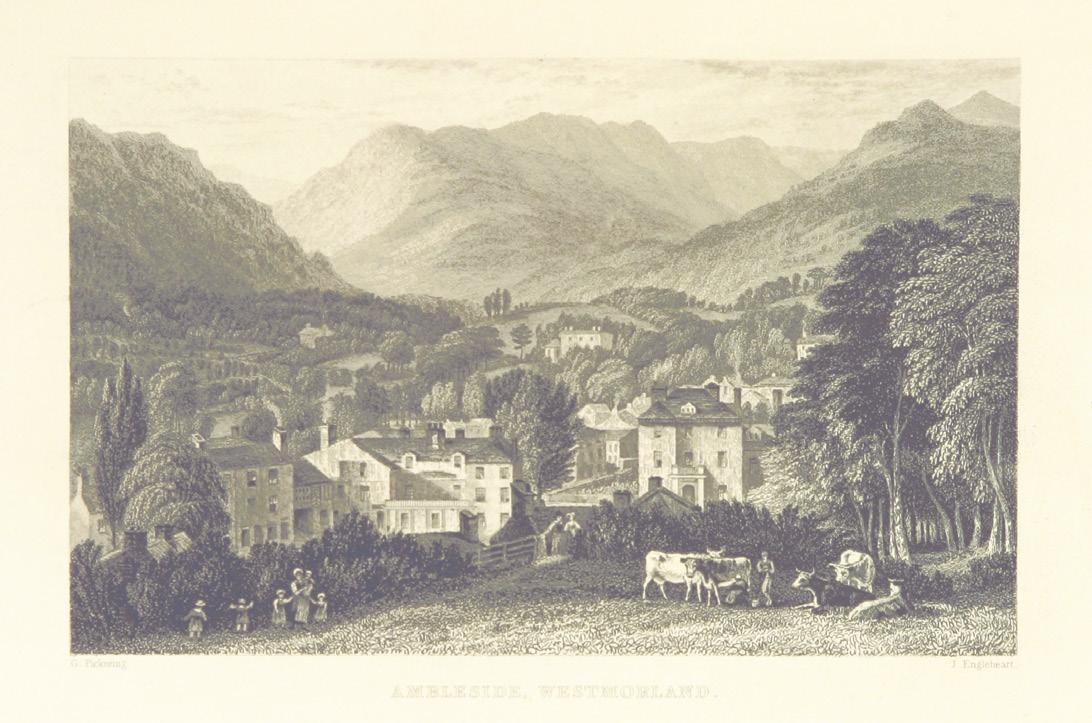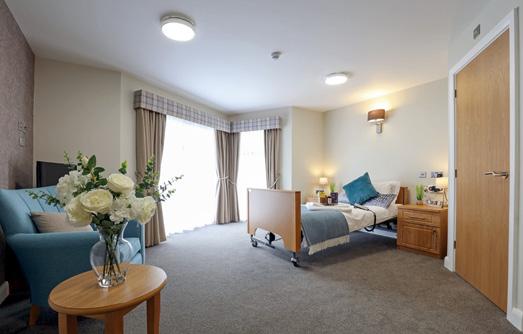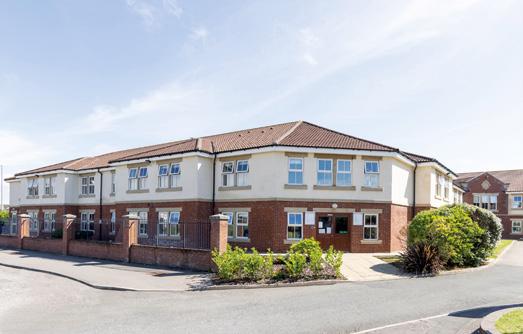
12 minute read
ANNE CLOUGH - A Pioneer of Education for Women
ANNE CLOUGH
- A Pioneer of Education for Women
Advertisement
By Margaret Brecknell
In October 1871 a new hall of residence was opened in Cambridge, which for the first time provided accommodation for women who wished to attend lectures at the university but lived too far away to commute daily.
Its origins were humble, but this establishment would later become Newnham College which, as it approaches its 150th anniversary, can still boast of being the oldest university college run by women, for women.
As its first Principal, Liverpool-born Anne Clough played an integral role in the early days of Newnham College and she is rightly celebrated today as one of the pioneers of further education for women in this country, both at Cambridge and here in the North-West.
Anne Jemima Clough was born on 20th January 1820, the only daughter of James, a wealthy cotton merchant of Welsh descent, and his wife Anne. When she was still a small child, the family emigrated from Liverpool to start a new life in the United States. She spent most of her childhood at Charleston in South Carolina until, in 1836, she and her parents returned to Liverpool.
Her brothers attended one of England’s most prestigious public schools, Rugby School,
but Anne was educated at home, as was the usual practice at the time for girls from middle/ upper-class families. This extract from her diary, which appeared in a later biography, illustrates how seriously the young Anne approached her studies,
Above: portrait of Anne Clough
“I must be very industrious this week; I should like to get up at 5, prayer and reading till 6, then Euclid and Greek till 7.30. From 9 till 11 at German, then reading Bible, French, the History of the Jews with mother till going-out time…. In the evening Hallam
and poetry”.
Anne was particularly close to her brother, Arthur, who would later become a well-known figure in his own right as a poet of some note. He is said to have “advised her as to her studies and kept her constantly supplied with books”.
Soon after returning to England, Anne began to work as a volunteer at a local charity school in Liverpool, an experience which would ignite her lifelong interest in education. She also appears to have harboured ambitions of becoming a writer but was compelled to abandon the idea when in 1841 her father’s business failed. Instead, in order to help with the family’s precarious financial position she established her own small day school.
It is apparent from her diary that in the early days Anne found the job difficult. In one entry from 1842 she writes, “At times get very tired of school-keeping, and find it more laborious and wearisome than I expected”. The school struggled to attract pupils and after four years she gave it up, but her passion for education remained. In 1847 she wrote that “I still hanker after a more decided vocation of teaching”.
The following year she finally had the opportunity to receive some formal teacher training in London, in conjunction with working in two of the capital’s schools, before being compelled to return home to Liverpool when her mother fell ill.
In 1852 Anne and her mother moved to Ambleside, an area which they knew well as a result
of many holidays in the Lake District. At that time Ambleside was not the tourist destination which it is today, but a quiet village which attracted only a handful of visitors each summer. It was hoped that the mountain air would benefit her mother’s health, but Anne was also excited by the prospect of being able to open a new school there. The Cloughs moved into a property called Eller How, which was situated on a steep hill above the village, and this is also
where Anne’s school was established.
This venture appears to have been more successful. Anne’s assistant, who subsequently took charge, later gave an interesting account of life at the school when she first arrived to work there,
Following the deaths of her mother and her much-loved brother, Anne moved to Surrey
During her time in the Lake District, Anne had hinted in letters to family and friends of her desire to take a more active role in campaigning on the social issues of the day, particularly regarding the creation of more opportunities for women. She may well have identified herself with her own description of women who had grown restless and “were like
“There were then about twenty day-scholars and two or three boarders, the children of chiefly well-todo shop and hotel-keepers, though some were from the families of professional men; they were from six to sixteen years of age, the little boys remaining till about ten or eleven. Miss Clough apparently took personal interest in each of them, and was evidently regarded as a much-respected friend”.

Above: Ambleside during 1850s
so that she could offer support to Arthur’s widow, Blanche, in bringing up their three small children. She was at first reluctant to give up her school, writing to an aunt in late 1861, “the thought that I shall probably have to give up my beloved school before long rather upsets me”. However, she finally made the move down south in 1863, leaving her former caged birds, with their strong passions intensified by the want of action”.
Now, following the move to Surrey she was able to become more involved and to join forces with other leading feminist reformers such as Emily Davies, Barbara Bodichon and Frances Buss. She also actively campaigned in the North-West, being the driving force behind the foundation of the North of England Council for Promoting the Higher Education of Women, which led to the organisation of lectures for women by the local universities.
In early 1871 Anne was invited to take charge of a new hall of residence, which would provide accommodation exclusively for women, on Regent Street in Cambridge. She at first
refused the job offer, before finally deciding in May to take it. When the hall first opened its doors in early October, there were only five students. An interesting account by a former student at the hall during those early days was later reproduced in Anne Clough’s biography,
“We lived very much the life of a family: we studied together, we had our meals
at one table, and in the evening we usually sat with Miss Clough in her sitting-room. We did our best to keep down household expenses: our food was very simple; we all, including Miss Clough, not only made our beds and dusted our rooms, but we helped to wash up after meals, and we did the domestic sewing in the evening.”
For all her later success, her early days in the role brought more than their fair share of difficulties. Her workload was heavy, added to which the cramped conditions in which she lived alongside the first intake of students led to some misunderstandings. One student recalled that “She did not quite enter into our notions of fun; perhaps she took things a little too seriously, and so she did not gain our full confidence in those early days…It was not until I ceased to be a student that I realised her wonderful goodness and greatness.”
The women’s presence at Cambridge was far from being universally popular in the early days, and Anne was probably more mindful than her students of the necessity to adhere to rules and not give the university authorities any reason to complain.
As she gained more experience in the role, so too did her ability to handle her students. Following a move to larger premises, Anne did not live at such close quarters with them and life at the hall became more structured. Her biographer notes that “After the first year it seems that Miss Clough’s authority was to some extent defined by rules. She consented to this, and to a plan of a life which was less like that of a family, because the students strongly desired it, but she did so with regret”.
Within four years the demand for places had grown so high that it was becoming difficult to find a suitable property in Cambridge which would provide adequate accommodation. The decision was taken to raise funds for a new purposebuilt hall to be constructed and Newnham Hall opened its doors for the first time in 1875.
Newnham College, as it is known today, was formally established in 1880, with Anne Clough as its first Principal. Its graduates include Rosalind Franklin, Dorothy Hodgkin and Iris Murdoch, as well as, more recently, Mary Beard, Diane Abbott and Clare Balding.
There is no doubt that Anne Clough made an invaluable contribution to Newnham’s early success and the role brought her the sense of fulfilment which she had sought for so long. She once remarked to a friend that she only found true happiness when she reached fifty years old, the age at which she took up residence in Cambridge.
She stayed at the college for the rest of her life. Arthur’s daughter, Blanche, came to read Classics at Newnham in 1884 and after completing her studies stayed on at the college to act as her aunt’s secretary. In February 1892 Anne Clough passed away after a short illness. Her niece, Blanche, would later go on to serve as Principal of Newnham as well as become her aunt’s biographer. A Memoir of Anne Clough, published five years after her death, provides some fascinating detail about her life and has preserved for posterity some of her personal journal entries, which may otherwise well have been lost.
The esteem in which Anne was held was reflected in the number of people who attended her funeral. An estimated three hundred people packed into King’s College Chapel, Cambridge, for the service on a snowy winter’s day including many of the university’s figures. Prime Minister, William Gladstone, and the Poet Laureate, Lord Tennyson, were amongst those who sent floral tributes.
Anne Clough lives on at Newnham College today in the name of the ornate bronze gates which stand at its entrance. She is also commemorated in her home city in the form of a stained glass window at Liverpool Cathedral, as well as having a Hall of Residence named after her at Edge Hill University in nearby Ormskirk. The homeeducated woman from Liverpool, who longed to make a difference, could hardly have dreamt that one day she would be regarded as one of the most influential figures in the women’s education movement.

New Care Home in Preston Welcomes its First Resident

A new purpose-built luxury care home near Preston has opened and welcomed its first resident.
Ribble Court Care Home in Much Hoole is a new 53-bed spacious and stylish home providing a mix of luxury residential care and specialist/complex nursing care.
The home, the sixth in the Sandstone Care Group, will be creating up to 80 jobs when the home is fully occupied.
Manager Samantha Smith welcomed the home’s first resident, Geoff Dunnings, a retired local policeman.
Samantha said: “We’re delighted that our new highquality, purpose-built home is now open and that Geoff is our first resident. We’ve been enjoying his stories about living in the area, his love of golf, which he used to play at Penwortham Golf Course and his life with his family.
“We’re looking forward to the home becoming an important part of the vibrant Much Hoole community.”
Geoff, 87, who is married to Joan with whom he has three children and three grandchildren, moved into Ribble Court after finding it hard to cope at home on his own.
A former policeman, he worked for Lancashire Constabulary as a Traffic Officer in Hutton until he retired. He said: “When I was living on my own at home I found that I had too many decisions to make, even down to what to eat and what to watch. It was too much. I’m now enjoying living at Ribble Court Care Home because I have no responsibilities and I can just relax and do what I want to do.”
Ribble Court Care Home is the sixth home in the Sandstone Care group, an independent, quality-driven care home operator whose primary purpose is to provide the same standards of care, comfort and compassion you would expect in your own home.
Sandstone Care believes the focus should always be on its residents, cared for by knowledgeable, gently, friendly and motivated carers and nurses within a loving and welcoming environment.
Other homes in the group include Longridge Hall and Fleetwood Hall, both in Lancashire, St Helens Hall in Merseyside, The Oaks in Newtown, Wales and Oak Springs in Liverpool. Ribble Court Care Home, 150 Liverpool Old Road, Much Hoole, Preston PR4 4QB. For more information or to book a private viewing to any of Sandstone Care’s home please: visit: www.sandstonecare.co.uk email: info@sandstonecare.co.uk or call: 0800 048 5774



Investment in Family Friendly Care Home in Fleetwood

A Fleetwood care home that prides itself on its family friendly ethos and homely atmosphere has invested £250,000 on dementia friendly interior design.
Fleetwood Hall Care Home is a specialist residential and dementia care home a short walk from the vast expanses of the Lancashire coast.
Operating at the very heart of the Fleetwood community, Fleetwood Hall is a warm and welcoming purpose-built luxury care home, with a devoted and passionate staff team intent on providing the very best care to its residents.
The Chatsworth Avenue home, which was awarded a ‘Good’ rating following a recent CQC inspection, is expertlyled by highly-experienced Home Manager, Joanne Warren.
The Sandstone Care Group, which runs the 62-bed home, worked with award-winning Catalyst Interiors to deliver a beautiful, safe and welcoming space for its residents.
Steve Donovan, Project Manager for Catalyst Interiors, said: “We updated all the facilities and refreshed the communal areas to create surroundings that will enhance the lives of the residents.
“We have also used dementia friendly artwork, clear labelling and strategic use of colour to gently help to signpost residents around the home.”


Home Manager Joanne Warren, who knows all the residents, said: “We have a brilliant team at Fleetwood and families love the fact that we are like one big family.
“We’ve had a really good response to the refurbishment from residents and their families and it has created a very relaxing environment.”
The home, which has a high rating of 9.4 on carehome. co.uk, is regularly praised by families of its residents for its home-cooked food, high standard of care, kindness, wide range of activities and great links to the community.
Fleetwood Hall Care Home, Chatsworth Avenue, Fleetwood FY7 8RW.
For more information or to book a private viewing to any of Sandstone Care’s home please: visit: www.sandstonecare.co.uk email: info@sandstonecare.co.uk or call: 0800 048 5774











